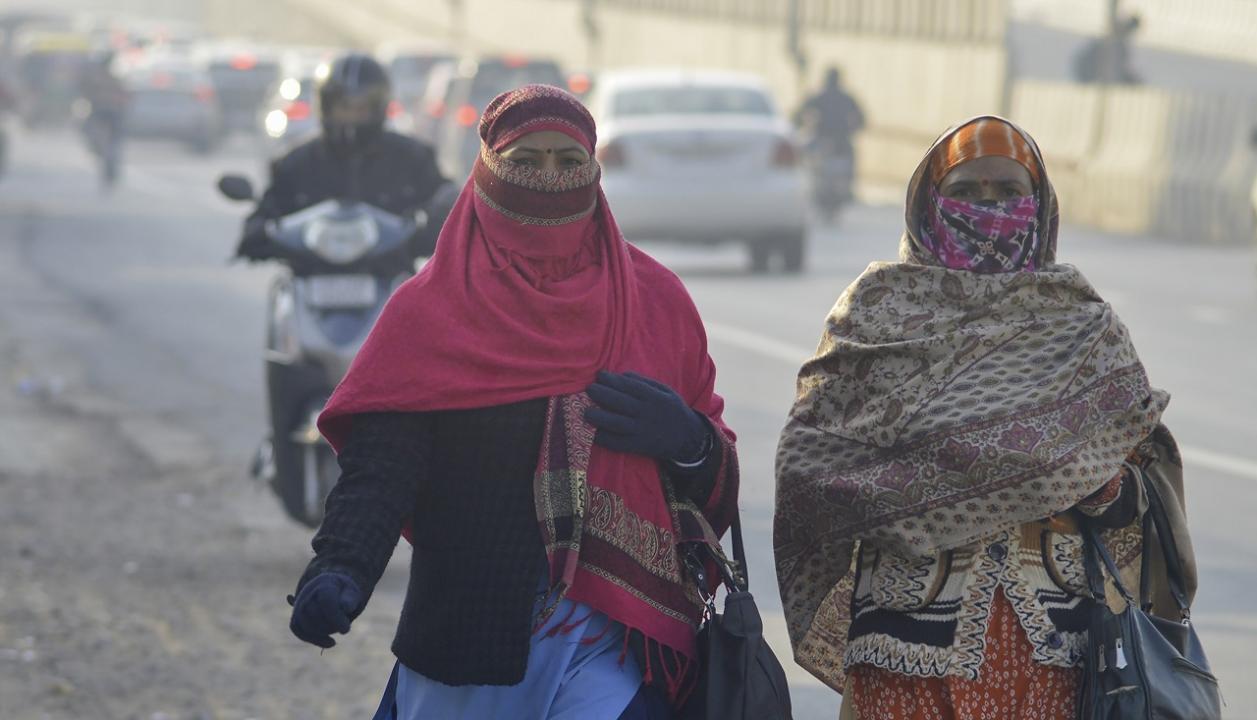With the frigid northwesterly winds from the Himalayas setting in over the plains, it is likely to get even colder in the region in the next two days

People head to work on a cold and foggy winter morning, in Gurugram. Pic/PTI
A biting cold wave swept north and northwest India on Monday with the minimum temperature settling in the range of one to three degrees Celsius in many parts.
ADVERTISEMENT
With the frigid northwesterly winds from the Himalayas setting in over the plains, it is likely to get even colder in the region in the next two days.
The Indian Meteorological Department (IMD) said cold wave conditions will abate from January 19 under the influence of two western disturbances which are likely to affect the region in quick succession.
When a western disturbance -- a weather system characterised by warm moist winds from the Middle East -- approaches a region, the wind direction changes.
The chilly northwesterly winds from the mountains stop blowing, leading to an increase in temperatures.
Cold wave to severe cold wave conditions prevailed in many parts of Delhi and some parts of Punjab, Haryana, Rajasthan, Uttar Pradesh and Madhya Pradesh, the IMD said in a statement.
"The minimum temperatures are in the range of one to three degrees Celsius over many parts of Punjab, Haryana, Chandigarh and Delhi, northwest and east Rajasthan; in the range of three to five degrees Celsius over the remaining parts of Rajasthan, many parts of west Uttar Pradesh," it said.
Churu, located near the Thar desert, logged a minimum temperature of minus 2.5 degrees Celsius, the lowest in the plains on Monday.
Also Read: Severe cold wave in Delhi, mercury plunges to 1.4 degrees Celsius
The Safdarjung observatory, Delhi's base station, saw the minimum temperature plunge to 1.4 degrees Celsius, the lowest in the month since January 1, 2021.
The weather station at Lodhi Road, where the IMD headquarter is located, recorded a minimum temperature of 1.6 degrees Celsius.
The minimum temperature plunged to 2.8 degrees Celsius at Ayanagar in southwest Delhi, two degrees Celsius at the Ridge in central Delhi and 2.2 degrees Celsius at Jafarpur in west Delhi.
The IMD said minimum temperatures are very likely to fall further by about 2 degrees Celsius over many parts of northwest India till January 17.
It said minimum temperatures will gradually rise by three to five degrees Celsius from January 18 to January 20 under the influence of the two fresh western disturbances.
In the plains, a cold wave is declared if the minimum temperature dips to four degrees Celsius or when it is 10 degrees Celsius and 4.5 notches below normal.
A severe cold wave is when the minimum temperature dips to 2 degrees Celsius or the departure from the normal limits is by more than 6.4 notches.
This story has been sourced from a third party syndicated feed, agencies. Mid-day accepts no responsibility or liability for its dependability, trustworthiness, reliability and data of the text. Mid-day management/mid-day.com reserves the sole right to alter, delete or remove (without notice) the content in its absolute discretion for any reason whatsoever.
 Subscribe today by clicking the link and stay updated with the latest news!" Click here!
Subscribe today by clicking the link and stay updated with the latest news!" Click here!








